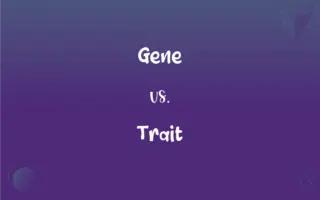Amidst vs. Midst: What's the Difference?
Edited by Aimie Carlson || By Janet White || Published on January 31, 2024
Amidst means 'in the middle of' or 'surrounded by'; midst means 'the middle part of' or 'during'.

Key Differences
Amidst and midst both refer to being in the middle of something, but their usage differs. Amidst is often used to convey being surrounded by something or in the middle of a situation. Midst, on the other hand, refers to the central part of something, often used more abstractly.
Amidst is typically used in a more literal, physical context, like being amidst a crowd. It implies a sense of being enclosed by what surrounds. Midst is often used to refer to a period or phase, like in the midst of a crisis, denoting a time period within a larger event.
In literature, amidst is used to create imagery of an environment or setting, such as amidst the trees. Midst is more about positioning within a temporal or situational context, as in the midst of negotiations.
The usage of amidst conveys a closer, more immediate relation to the surroundings. Midst, while also denoting a central position, often has a broader, sometimes metaphorical application.
Both words can be used interchangeably in some contexts, but amidst often implies a physical presence, while midst is more versatile, applying to time, events, or abstract concepts.
ADVERTISEMENT
Comparison Chart
Primary Meaning
In the middle of, surrounded by
The middle part of, during
Usage Context
Physical and literal
Temporal, situational, or abstract
Example Use
Amidst the crowd
In the midst of a crisis
Imagery
Physical environment
Temporal or situational context
Interchangeability
Less interchangeable
More interchangeable
ADVERTISEMENT
Amidst and Midst Definitions
Amidst
In the middle of; during.
Amidst the chaos, she remained calm.
Midst
During; in the process of.
In the midst of the storm, they took shelter.
Amidst
Enclosed or enveloped by.
The cabin was hidden amidst the trees.
Midst
In an important or critical phase.
They were in the midst of making a decision.
Amidst
Surrounded by; in the environment of.
She stood amidst the flowers.
Midst
Within the context or environment of.
In the midst of turmoil, hope emerged.
Amidst
Among; in the company of.
He found comfort amidst his friends.
Midst
Among; in the company of.
She felt lost in the midst of the crowd.
Amidst
In an atmosphere or setting of.
Amidst the celebration, they announced the news.
Midst
The central part or point.
He was in the midst of the forest.
Amidst
Variant of amid.
Midst
The middle position or part; the center
In the midst of the desert.
Amidst
In the midst or middle of; surrounded or encompassed by; among.
Midst
A position of proximity to others
A stranger in our midst.
Amidst
In the midst or middle of; surrounded or encompassed by; among.
But rather famish them amid their plenty.
The seraph Abdiel, faithful found;Among the faithless faithful only he,
From amidst them forth he passed,
Those squalid cabins and uncleared woods amidst which he was born.
Midst
The condition of being surrounded or beset by something
In the midst of all of our problems.
Midst
A period of time approximately in the middle of a continuing condition or act
In the midst of the war.
Midst
Among; amid.
Midst
A place in the middle of something; may be used of a literal or metaphorical location.
Midst
(rare) Among, in the middle of; amid.
Midst
The interior or central part or place; the middle; - used chiefly in the objective case after in; as, in the midst of the forest.
And when the devil had thrown him in the midst, he came out of him.
There is nothing . . . in the midst [of the play] which might not have been placed in the beginning.
Midst
Hence, figuratively, the condition of being surrounded or beset; the press; the burden; as, in the midst of official duties; in the midst of secular affairs.
Midst
In the midst of; amidst.
Midst
In the middle.
Midst
The location of something surrounded by other things;
In the midst of the crowd
FAQs
Is midst used in a more abstract sense?
Yes, it's often used in abstract or metaphorical contexts.
Does amidst have a more immediate connotation?
Yes, it implies a direct, immediate presence.
Is amidst only used for physical locations?
Primarily, but it can have broader applications.
Does amidst convey a sense of immersion?
Yes, it implies being closely surrounded or enveloped.
What does amidst mean?
It means being surrounded by or in the middle of something.
What does midst mean?
It refers to the central part or during a particular period.
Can amidst and midst be used interchangeably?
Sometimes, but amidst is more physical and midst more abstract.
Does midst always refer to time?
Often, but it can also refer to being in the central part of a situation.
Can amidst imply an emotional state?
Yes, like feeling joy amidst sadness.
Is midst suitable for describing physical environments?
It can be, but it's more common in temporal or situational contexts.
Can midst be used to describe a physical position?
Yes, like being in the midst of a room.
Does midst suggest a broader context?
Yes, it often encompasses a wider situational or temporal scope.
Is midst more flexible in usage?
Yes, it has a broader range of applications.
Can amidst be used for time periods?
Less commonly, but it's possible.
Is amidst suitable for poetic use?
Yes, its vivid imagery is often used in poetry.
Is amidst more vivid in imagery?
Yes, it often creates a clearer picture of the surrounding environment.
Can amidst be used metaphorically?
Yes, though it's less common than its literal use.
Does amidst focus on the immediate environment?
Yes, it emphasizes the immediate surroundings.
Is midst often used in literature?
Yes, especially in narrative contexts.
Can midst imply a transitional phase?
Yes, like being in the midst of change.
About Author
Written by
Janet WhiteJanet White has been an esteemed writer and blogger for Difference Wiki. Holding a Master's degree in Science and Medical Journalism from the prestigious Boston University, she has consistently demonstrated her expertise and passion for her field. When she's not immersed in her work, Janet relishes her time exercising, delving into a good book, and cherishing moments with friends and family.
Edited by
Aimie CarlsonAimie Carlson, holding a master's degree in English literature, is a fervent English language enthusiast. She lends her writing talents to Difference Wiki, a prominent website that specializes in comparisons, offering readers insightful analyses that both captivate and inform.































































